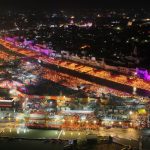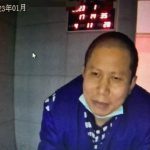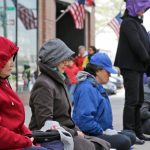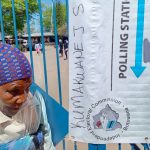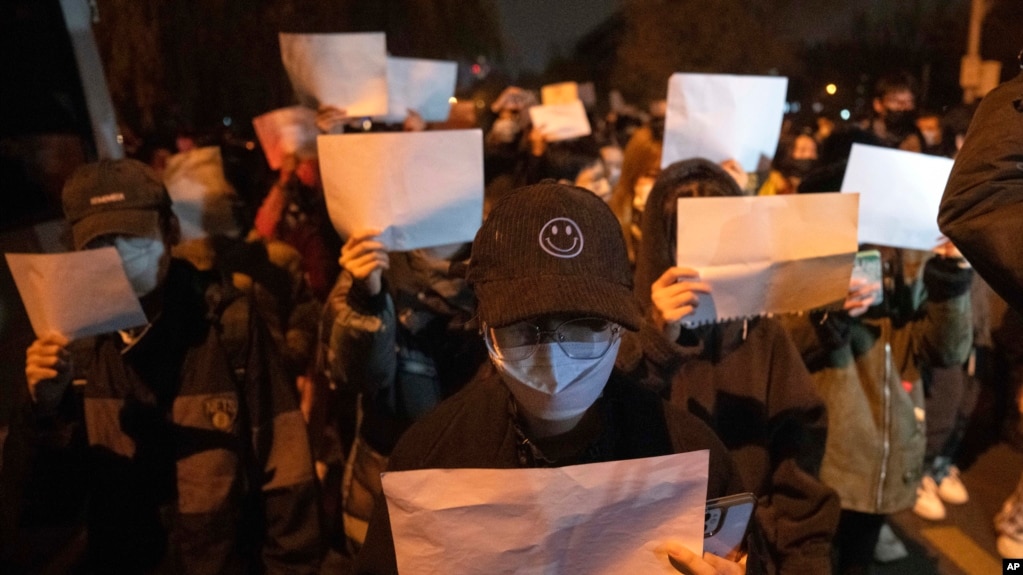
FILE – Protesters hold up blank pieces of paper and chant slogans as they march to protest strict anti-virus measures in Beijing, Nov. 27, 2022.
Taipei, Taiwan —
Chinese exiles gathered in cities around the world to mark the second anniversary of the “White Paper Movement” in China, saying the demonstrations against the COVID-19 lockdown policies have inspired a new generation of pro-democracy Chinese activists.
To prevent the spread of coronavirus across China, the Chinese government from early 2020 to late 2022 regularly imposed lockdowns on entire buildings, villages and even cities.
The 2022 movement was a nationwide citizen-initiated protest that eventually forced the Chinese government to end the restrictive policies in November of that year.
In Amsterdam, a candlelight vigil marked the anniversary with some 50 people who held flowers, candles, pieces of blank paper, or wore white masks. They gathered at Dam Square in downtown Amsterdam on Sunday.
Other commemorations were held in Berlin, London, San Francisco and Tokyo. At the events, exiled activists shared their experiences during the monthlong, nationwide protest from two years ago.
They remembered the protesters who remain in detention after participating in the demonstrations and commemorated those who lost their lives during a deadly building fire in Xinjiang’s capital of Urumqi. Lockdown measures may have kept firefighters from entering the high-rise in time and prevented some residents from exiting the building. The fire killed 10 people.
Following the deadly event, a protest erupted on the campus of Nanjing University of Media and Communication on November 25, 2022, where students held up blank pieces of paper as symbols of their protests against the Chinese authorities’ control of free speech.
“Following lengthy lockdowns across China, It felt like the civil society was on the brink of an explosion in November 2022, so when I read the news about the deadly fire in Xinjiang, I felt like we were all living in hell,” said Rei Xia, an exiled Chinese activist and one of the organizers of the vigil in Amsterdam.
The movement was dubbed “the White Paper Movement” or the “White Paper Revolution” as demonstrations spread to several cities, including Shanghai. Police arrested many participants. Those detained said they were tortured.
“I also remembered being forced into a corner at the detention center while the guards tried to force me to confess to some forged testimonies by threatening to shave my head or prolonging my detention,” Rei Xia told VOA by phone.
“I was surrounded by the police at the scene, punched and kicked, and then I was picked up and carried to the van by the police,” said Jack Wei, a former White Paper Movement participant from Chengdu, who now lives in the United States.
“When interrogated, I said that I was against the pandemic prevention policy … and I wanted to eat [and] not do coronavirus tests. They forced me to sign a letter of repentance and gave me a warning,” he recalled during a conference in San Francisco on November 17.
VOA reached out to the Chinese foreign ministry and the Chinese embassy in Washington for comment but did not receive a response at the time of publication.
While hundreds of overseas Chinese took part in candlelight vigils, relevant keywords were censored on the Chinese internet. When VOA entered “the White Paper Movement” on the popular microblogging site Weibo, there were no relevant results.
Although many protesters were targeted in the nationwide crackdown following the protests, Huang Yicheng, a 28-year-old former student of Peking University, managed to escape from arrest and hid.
Months later, he fled to Germany via Hong Kong and began to publicly advocate for other White Paper protesters who had been arrested or detained by Chinese authorities.
“I become an advocate for other participants after going into exile, and I have to cope with all kinds of harassment and risks associated with the Chinese government’s increasingly frequent transnational repression campaigns,” he told VOA.
While memories of the movement have faded for some people, Huang said the protests created powerful symbols that continue to inspire a younger generation of Chinese activists.
“The blank papers, candles, flowers and the road sign of Urumqi Road are all important symbols of resistance for young Chinese activists,” Huang said.
Some exiled Chinese activists said the White Paper Movement has also rejuvenated the overseas Chinese democracy movement, which has been mainly headed by activists from the Tiananmen Square Massacre in 1989.
“Since the White Paper Movement, many young Chinese people abroad have begun to emerge, and this trend provides new hope for the overseas Chinese democracy movement,” U.S.-based Chinese human rights lawyer Teng Biao told VOA by phone.
Huang in Germany said some strategies used by activists outside of China have inspired protesters in major Chinese cities, but the rapidly shrinking space for dissent and activism in China is making attempts to organize protests more difficult.
“After overseas Chinese people in New York combined Chinese political sarcasm with Halloween in 2022, we have seen similar tactics being used by young Chinese people in Shanghai during Halloween in 2023 and 2024, but local police quickly impose restrictions and arrest people,” he said.
Teng in the U.S. said Beijing’s efforts to tighten control over civil society have not only deprived Chinese people of their basic rights and freedoms but also led to violent acts across the country.
“The Chinese authorities’ attempt to limit freedom of speech and restrict citizens’ basic rights have pushed many people to the brink and at a time when the Chinese economy remains sluggish, the underlying social crisis will be exposed,” he said.
Huang said since the Chinese government will likely maintain its repressive approach to controlling civil society, overseas Chinese activists like him can only try to highlight the problems that exist in China.
“We can only urge people in foreign countries to pay attention to the different kinds of problems in China.” He said he is worried the violent attacks in recent weeks may cause deeper issues in the country going forward.
With no hint of Beijing loosening its control over the country in the horizon, Xia in Amsterdam said she is determined to keep tracking social and human rights issues in China.
“Social movements have become an important part of my life because of the White Paper Movement, and this experience has really empowered me,” she said.
Zhou Chenxing from VOA Mandarin contributed to the report.
By:VOA



